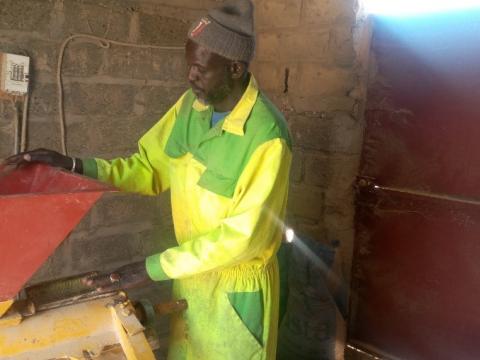From the warmth of Cambessa to the greenery of Baboulaye: Babacar reflects after repeated attempts at illegal emigration

"My name is Babacar Ndongu, 45 years old, and I live in Dioffior in the district of Ndouk. I am a father of six children; all under 12 years old. I made four attempts at illegal emigration between 2017 and 2020. The last one dates back to February 2020 when I myself had to transport a pirogue to Spain from Guinea Bissau. On the eve of this last failed attempt, I left Cambessa (Guinea) to return to Dioffior".
Babacar is widely recognised in the municipality thanks to his commitment and love for work. It was precisely in 2015 that he returned from Dakar and opened a business in Moulin in his village of Dioffior, after spending a few years in the port of Dakar. For him, the income earned through his activities was so insufficient for his family responsibilities, and this was what prompted him to attempt the route of illegal emigration to Europe. "I lost more than 2,500,000 CFA Francs (USD 4,500) during my various attempts" says Babacar.
It was through one of his friends by the name of Babou that Babacar learned of the potential of the Baboulaye valley, of the Support Project for the Reduction of Rural Emigration in the Groundnut Basin (PARERBA), and of the possibilities of investing in rice cultivation.
World Vision, within the framework of the PARERBA project funded by the European Union, is working in collaboration with ISRA (Senegalese Institute for Agricultural Research) on the recovery of salty lands in the Baboulaye site on a potential of 1,000 ha deliberated by the town hall of Dioffior.

Today, after two years of project activities on the site, there is a return from producers accentuated by a decline in salinity through a cocktail of technologies used on site.
Having followed the advice of his friend, Babacar decided to stay and invest in rice growing during the winter 2020 campaign. He sowed 1.25 hectares in the Baboulaye valley and was able to benefit from the support in seeds and techniques of the project but also of the association "Saax diaam" which facilitated the allocation of his plot.
He also bought a rice huller at the start of the campaign to broaden the scope of his activity through service provision.
“I was one of the first producers to harvest rice in the valley and thank goodness I got a really good harvest which I never imagined I would have because it was my first time to practice this crop. My harvests are estimated at 3.5 tonnes. Also during this campaign, I was able to employ 12 people who are mothers and fathers living in Dioffior. The employees take care of an average of four children thanks to their income. This is my greatest satisfaction as I am a father myself and a lot of people are counting on me today. In view of the results that I obtained this year, I am in the process of asking the association "saax diaam" to grant me four hectares to sow for next year, I also intend to promote rice straw by silage with the support of the World Vision team to invest in beef fattening but also in market gardening. I am currently preparing an onion campaign for this cold off season."

"Today, the idea of leaving for Europe is behind me. Besides, I don't want to hear the word 'emigration' spoken any more. I never knew I could stay and be successful here in Dioffior so close to my family, friends and loved ones. Now I know it's possible. I myself am making a plea to my emigrant friends to come and invest in rice growing and agriculture in general. I would like to thank PARERBA and its entire team through these actions on the site and for having largely contributed to the recovery of this essential productive base for the Diofior population” testifies Babacar.
According to Saint Augustine, “Happiness is to continue to desire what you have.” Babacar's example must inspire many young people who are desperate and struggling to believe in themselves and in their potential to succeed in their localities.
About PARERBA
The Support Project for the Reduction of Rural Emigration and Reintegration in the Groundnut Basin (PARERBA), financed by the European Union, within the framework of the subsidy agreement between Enabel / Parerba and World Vision, has as its main objective to combat poverty in Senegal, in particular by creating jobs for young people faced with the phenomenon of emigration. World Vision is implementing the project in the regions of Fatick, Kaolack and Kaffrine to help create and stabilise rural jobs in the agri-food sectors along two strategic axes:
• Strengthening production and marketing, to help create real wealth for the beneficiary partners;
• The development of entrepreneurship by supporting economic operators, upstream and downstream of the agri-food chains, by strengthening their technical and organisational capacity, access to finance and improvement of their businesses.
This story was produced with the financial support of the European Union. Its content is the sole responsibility of PARERBA and does not necessarily reflect the views of the European Union.
By Ibrahima Gueye, Facilitator of PARERBA, Fimela